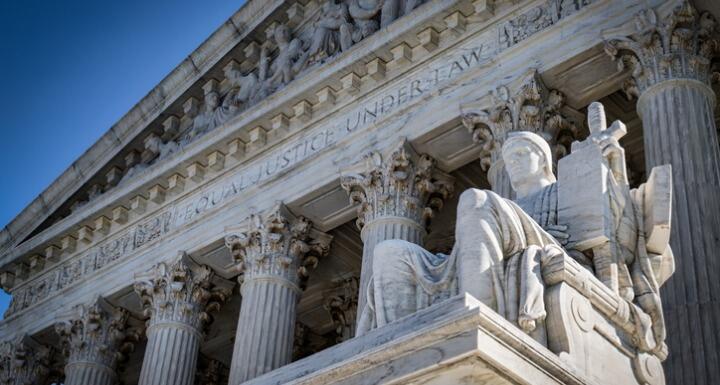U.S. trademark law saw numerous developments in 2020, including three decisions by the U.S. Supreme Court. Trademark cases seldom make it up to the United States’ highest court, which typically hears one or two such cases every few years. The INTA Young Practitioners Committee recently discussed the 2020 decisions.
The “Young Practitioners Virtual Panel Discussion: 2020 U.S. Supreme Court Decisions in Trademark Cases” took place on December 17, 2020.
Wasserbauer Law LLC (USA Lee Law PLLC (USA), and Ware Fressola Maguire & Barber LLP (USA) co-hosted the event in connection with INTA’s Young Practitioners Committee. Approximately 35 young practitioners participated in the event.
(Ed. Note: This article was first published by the International Trademark Association on inta.org and is co-authored by Mark Landauer of the University of St. Thomas School of Law.)
Romag Fasteners, Inc. v. Fossil, Inc.
Christopher Lackert (Wasserbauer Law LLC, USA) of the Young Practitioners Committee led a discussion of Romag Fasteners, Inc. v. Fossil, Inc., specifically focused on statutory interpretation of the Lanham Act. The analysis looked at the final text and discussed the intention of the statute.
Prior to the Supreme Court decision, there was a circuit split over whether willfulness is a precondition to an award of infringer’s profits in a trademark infringement action. The Lanham Act includes express provisions on the awarding of damages for trademark infringement; however, as other similar sections of the Lanham Act speak to mental state in reference to damages, some lower courts had read the requirement into an award of infringer’s profits.
The Supreme Court found the opposite to hold true, instead, finding an absence of mental state language in this section of the statute to control. The Court held that the mental state of the infringer is an important consideration, but not the only consideration, for an award of infringer’s profits. Put another way, willfulness is not an absolute precondition for the awarding of profits for trademark infringement.
This case was covered here in the May 15, 2020, INTA Bulletin.
Lucky Brand Dungarees, Inc. v. Marcel Fashions Group, Inc.
Michael Lee (Lee Law PLLC, USA), of the Anticounterfeiting Committee, U.S. Subcommittee, broke down the Supreme Court’s decision in Lucky Brand Dungarees, Inc. v. Marcel Fashions Group, Inc.
On this outcome, Mr. Lee remarked, “The only lucky ones are the attorneys,” referring to the length of the case and the indeterminate outcome for either side.
The discussion followed the case’s deep dive of “defense preclusion,” where a party cannot rely on a defense in subsequent litigation if the parties have previously both litigated and obtained a final judgment on the merits.
The Supreme Court decided Lucky Brands could raise a defense submitted in earlier litigation because the subsequent litigation captured different conduct. In other words, while the affirmative defense was the same, it was two different cases, about two different marks, at two different times, and therefore there was no defense preclusion.
The discussion brought back strong memories for young practitioners of their first-year civil procedure course.
This case was covered here in the July 29, 2020, INTA Bulletin.
U.S. Patent and Trademark Office v. Booking.com B.V.
Finally, Steve Cooper (Ware Fressola Maguire & Barber LLP, USA) led the young practitioners through USPTO v. Booking.com, with a side-by-side comparison of the USPTO’s arguments with the Supreme Court’s holdings. The young practitioners gained a better understanding of the Court’s reasoning regarding “generic.com” marks by going through hypothetical scenarios asked by the justices in the case to test the petitioner’s arguments.
Trademark law prevents registration of generic terms—terms that the relevant purchasing public understands primarily as the common or class name for the goods or services. In USPTO v. Booking.com, the Supreme Court decided adding “.com” to the end of the generic term “booking” was eligible for registration but noted that such a registration heavily depends on how consumers perceive the mark. According to the Court, consumers perceive booking.com as a source indicator.
Mr. Cooper referenced the Examination Guide issued by the USPTO after the Supreme Court decision, showing how these decisions change actual legal practice. He ended the discussion by posing a question to the young practitioners: what if we apply the Supreme Court’s logic in “generic.com” marks to “#generic” marks?
The Booking.com case was covered here in the July 8, 2020, INTA Bulletin.
After the discussion of cases, Mr. Lackert, Mr. Lee, and Mr. Cooper answered questions on topics that included “work-from-home” trademark litigation, USPTO auditing for continued use filings, and Pepperidge Farm’s Goldfish crackers as source indicators.
This article was first published by the International Trademark Association on inta.org.
About the Authors:

Erica Rogers assists individuals, small businesses, and large corporations with a wide array of intellectual property matters. Her practice focuses on trademark selection and clearance, trademark prosecution and registration, and trademark portfolio management. She also routinely engages in resolving trademark disputes, including drafting cease and desist letters, negotiating coexistence agreements, providing subject matter expertise for litigation in federal court, and handling cases before the Trademark Trial and Appeal Board (TTAB).
 Mark Landauer graduated cum laude from the University of St. Thomas School of Law. He currently practices law in Minnesota.
Mark Landauer graduated cum laude from the University of St. Thomas School of Law. He currently practices law in Minnesota.








